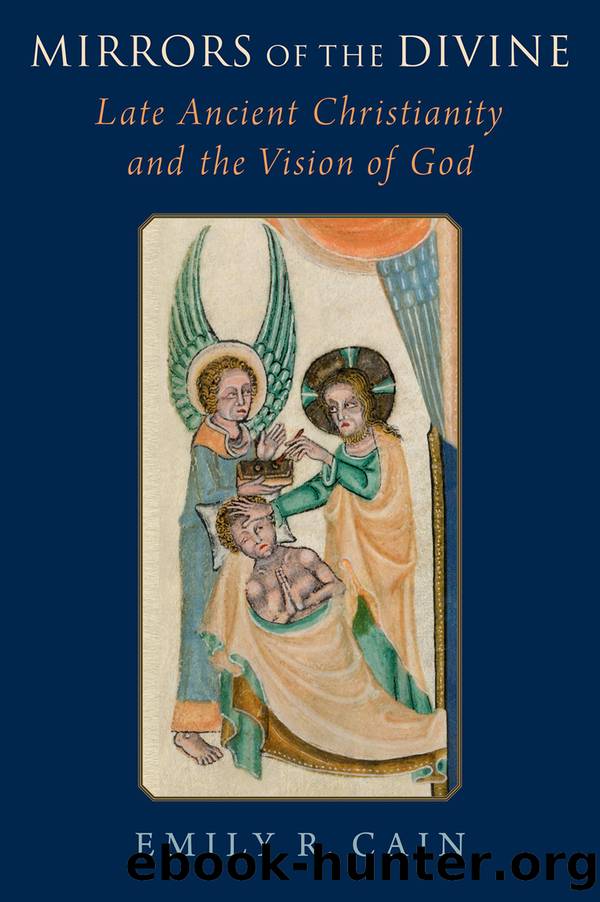Mirrors of the Divine by Emily R. Cain

Author:Emily R. Cain
Language: eng
Format: epub, pdf
Publisher: Oxford University Press
Published: 2022-04-15T00:00:00+00:00
In other words, the world of senses is totally dependent upon the world of forms, like a mirror rather than a painting. Armstrong notes, âWhat his preference for the mirror-reflection rather than the picture enables him to bring forward and stress is, first, the intimacy and immediacy of the relationship of all below it to the eternal, and, second the direct spontaneity of the eternalâs creative self-diffusion.â80 In other words, the mirror analogy suggests both an intimate link between the world of forms and the world of senses as well as an immediate link between the two. This distance and immediacy will be important concepts for both Gregory of Nyssa and Augustine of Hippo, though they will differ in their interpretations of oneâs agency and ability to ascend through that mirror.
Plotinus does not despise the mirror world of senses but instead finds it beautiful.81 The problem comes, for Plotinus, in making too much of the reflections found in the mirror: âBut, as it is, the producers of the appearances are different from the things seen in matter, and we can learn from this the falsity of the affection, since what is seen in matter is false and has no sort of likeness to what produced it.â82 The forms that are seen in the sensible world are a lie if they are mistaken for the intelligible: such forms have no similarity to true beings because they are non-being.83 This causes the mirror of beauty to turn into the mirror of entrapment.
Yet this mirror can also aid one to see the âinconceivable beautyâ if properly used. Plotinus asks of this beauty, âBut how shall we find the way? What method can we devise? How can one see the âinconceivable beautyâ which stays within the holy sanctuary and does not come out where the profane may see it?â84 His response is to encourage his readers to leave âthe sight of his eyes,â to avoid bodily splendors, to remember that such beauty in bodies is merely an image, trace, and shadow, and to encourage his readers to run after what it is that these images reflect.85
Those who mistakenly direct their attention to the body, he asserts, will tarnish their mirrors, preventing awareness of spiritual life. These people are like Narcissus, and they will âstay blind in Hades, consorting with shadows there and here.â86 Against this, Plotinus encourages his readers to be like Ulysses, who discovers that the body is a mere reflection of prior light to which one must return.87 Plotinus famously asks his readers to âShut your eyes, and change to and wake another way of seeing, which everyone has but few use.â88 This other way of seeing, for Plotinus, appears to be more metaphorical than in earlier authors, largely due to his complicated theory of bodily visual perception. Since bodily visual perception does not occur through touch, but rather though sympatheia and color, there is not a parallel process for mental visual perception. Still, Plotinus relies heavily on the metaphor of vision to describe the relationship between the human and the divine.
Download
This site does not store any files on its server. We only index and link to content provided by other sites. Please contact the content providers to delete copyright contents if any and email us, we'll remove relevant links or contents immediately.
The Secret Power of Speaking God's Word by Joyce Meyer(3171)
Signature in the Cell: DNA and the Evidence for Intelligent Design by Stephen C. Meyer(3125)
Real Sex by Lauren F. Winner(3013)
The Holy Spirit by Billy Graham(2943)
The Gnostic Gospels by Pagels Elaine(2527)
Jesus by Paul Johnson(2352)
Devil, The by Almond Philip C(2324)
23:27 by H. L. Roberts(2245)
The Nativity by Geza Vermes(2226)
Chosen by God by R. C. Sproul(2160)
All Things New by John Eldredge(2157)
Angels of God: The Bible, the Church and the Heavenly Hosts by Mike Aquilina(1954)
The Return of the Gods by Erich von Daniken(1929)
Angels by Billy Graham(1921)
Knowing God by J.I. Packer(1852)
Jesus of Nazareth by Joseph Ratzinger(1808)
Evidence of the Afterlife by Jeffrey Long(1783)
The Gnostic Gospel of St. Thomas by Tau Malachi(1782)
How To Be Born Again by Billy Graham(1775)
